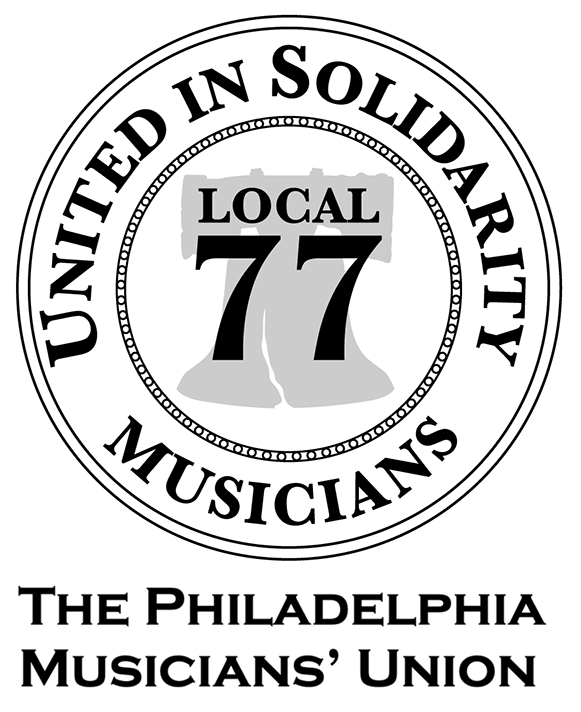95% of Philly POPS Musician Union Members Vote to Strike If Necessary
“It sure seems like these execs were planning this whole time to take the money, shut down the company, and toss out the musicians along with the liabilities.”
Philadelphia, PA— The Philly POPS musicians, members of The American Federation of Musicians, Local 77, voted yesterday to authorize a strike, if necessary, in order to resolve what they consider to be urgent disputes related to management’s lack of transparency before announcing that Philly POPS operations will cease next year. According to the Union’s official count, at least 95% of Philly POPS players voted to authorize a strike if necessary.
“We have been trying to get Philly POPS management to negotiate contract commitments since August. It’s been more than 90 days since we gave them our most recent proposal,” said Ellen Trainer, President of AFM Local 77, the union representing the POPS orchestra musicians. “After decades of loyal service to the POPS, these musicians are the Philly POPS. They’re one in the same. There was no reason to illegally hide the truth from us while we were in active contract negotiations. There is no reason to stonewall these workers’ needs. There’s no reason to send them home for the holidays with no idea how their families are supposed to budget for the new year.”
Trainer was referencing on-going collective bargaining in which the Union has been waiting for answers to dozens of key questions about the POPS financial situation, what arrangements have already been made with the Kimmel Center for taking over Philly POPS concerts, and whether the current or future employer plans to recognize the current roster of Union performers and their contract.
According to the Union, many Philadelphia patrons of the Philly POPS have come forward in support of protections for the musicians, whose work, they say, has made executives wealthier while the company has let over three months go by without a response to the Union’s latest proposal.
“The POPS management paid themselves quite well for over a decade, even though they ran-up losses for eight of the past 10 years. It sure seems like these execs were planning this whole time to take the money, shut down the company, and toss out the musicians along with the liabilities,” said longtime Philly POPS concertgoer and Kimmel Center enthusiast, Kenneth Hutchins.
Trainer says a lot of rumors have been circling since the announcement on November 16th that Encore Series, Inc., the owner of the Philly POPS, plans to end their productions. “We just need them to provide accurate information in a useful, legal format and to negotiate in good faith. No more games while people’s livelihoods are at stake,” Trainer added, referencing at least one legal charge against the Philly POPS company filed by the Union, asserting that the company has conducted itself in violation of federal labor laws.
“We found out the POPS wanted to dissolve the company on the same day everyone else saw it on the news. This whole time we have been negotiating for our future, they never bothered to tell us they were abandoning that future. When we found out that we would need to get an agreement that protects us and our contract, they didn’t even bother to send their own negotiator to our most recent bargaining session,” says Brooke Beezley, a cellist for the Philly POPS for the past 35 years, who has helped lead the musicians during their contract negotiations.
“If these executives just drove the bus over a cliff and ejected themselves with a financial parachute, then we need to make sure it’s not just an opportunistic feast for vultures picking at the carnage. Some of these workers have been with the POPS since the beginning in the ‘70s,” says Matt McIntyre, President of IATSE (the International Alliance of Theatrical Stage Employees) Local 8, whose career includes years of work at the Kimmel Center. “We need to make it clear that none of the people benefitting from this disaster are above the law. We’re honored to fight with these musicians for fairness and a fair transition.”
“Striking is the absolute last thing we want to have to do,” says Marjorie Goldberg, a teaching artist and violist who has played in the Philly POPS orchestra for 22 years, and who also serves as Local 77’s Vice President. “With some transparency, law-abiding decisionmakers can save the entire institution, even the program that connects professional musicians like me to aspiring students in underserved schools where there are no music teachers.”
“We can start by making sure we have protected professional musicians in the first place, where the Philly POPS players will have, in writing, the same hard-fought Union protections, or better. That’s how we stop the bleeding and stabilize after being blindsided like this,” added Trainer.
Paul Arbogast, a trombone player for the Philly POPS who is a member of the musicians’ contract negotiation committee, provided this written statement from the Philly POPS Orchestra Committee:
We know it should not be necessary to strike for these most basic protections, but –for our patrons, for our 43-year legacy, for our families, for own basic rights and dignity, for holding the line on an industry that wants a monopoly over all of us, for the precedent we need to set for all the other resident orchestras, and for passing the torch to our students and their pathways to the next generation of musicians—we will strike if we have no other choice.
Founded in 1903, The American Federation of Musicians, Local 77 is comprised of over 750 musicians throughout the Philadelphia area, many of whom are counted among the best performers in the world in their respective categories.
